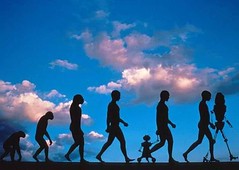 Is there a connection? I've been thinking about the possibility for probably the past year year now and reading chapter 10, "Life's Own Code" from Glieck's "The Information: A History, A Theory, A Flood" has suggested it to me. (The following chapter -- "Into the Meme Pool" -- would have done it if I had been a little slower.)
Is there a connection? I've been thinking about the possibility for probably the past year year now and reading chapter 10, "Life's Own Code" from Glieck's "The Information: A History, A Theory, A Flood" has suggested it to me. (The following chapter -- "Into the Meme Pool" -- would have done it if I had been a little slower.)In a way, libraries could be thought of as "anti-evolution". Not "anti-evolutionary theory" but rather working against the force of evolution. As it is in meme theory, ideas have a life of their own, literally not figuratively. Concepts, plans, images, theories, etc. have "survivability" and replicate themselves and can be thought of as surviving, or better yet, thriving the more copies there are of them and the more they are replicating themselves. The idea of the resurrection of Jesus Christ is a particularly successful. My grocery list from last week, not so much. So what do libraries collect? Ideas encased in containers, in a way, frozen in time. The librarian's job is typically two-fold: preservation and access. We collection valuable resources to "save" them from the wilds of the information wilderness, but then also house them in such a way as to allow people to look at them and use them as they see fit. The analogy to genetic evolution could be something like a zoo, animal conservation area, or even cryogenic lab. We house books, journals, videos, etc. in a safe place, away from the damage that could be done to them while in the hands of the users, publishers, society in general. And then we provide a controlled environment for the ideas inside those "idea-holders" to come out and play, or more accurately, reproduce. When patrons read a journal article, skim through a textbook, watch a video, practice a piece of music, what they are doing is producing an inexact copy inside their mind, in effect, allowing the meme(s) to multiply and escape the confines of the collection.
So libraries are both anti-evolution, in that the organisms are stored away to ensure non-replication (or rather non-imperfect-replication) and pro-evolution, in that the organisms are allowed to reproduce, and in fact, the storage is done for the express purpose of continued and "appropriate" reproduction.
Our job as library workers is made easier and more difficult by the differences in reproduction of ideas as compared to living organisms. Pure replication is easier of course, so that maintenance of content is made possible by the practice of perfect replication (e.g. LOCKSS). On the other hand, any replication is easier so that more control and therefore more work is necessary to ensure that unwanted replication doesn't happen (e.g. loss of "old versions" that some shareholders such as publishers may consider valueless but may have value to others). It's easier to "freeze" content in containers unlike cryogenically storing animals or plants (e.g. archiving old electronic journals). On the other hand, extended storage without active involvement can involve loss of content as well (e.g. unsupported formats and/or technological failure).
What does this mean for librarians? I'm not sure. Perhaps thinking about the work of librarianship in this way can help us prepare for the inevitable disintegration and/or substantial alterative of content. If we consider the ultimate goal of librarianship is to ensure a certain kind of "idea mutation" then it puts preservation and access assurance into a slightly difference light, doesn't it?

No comments:
Post a Comment